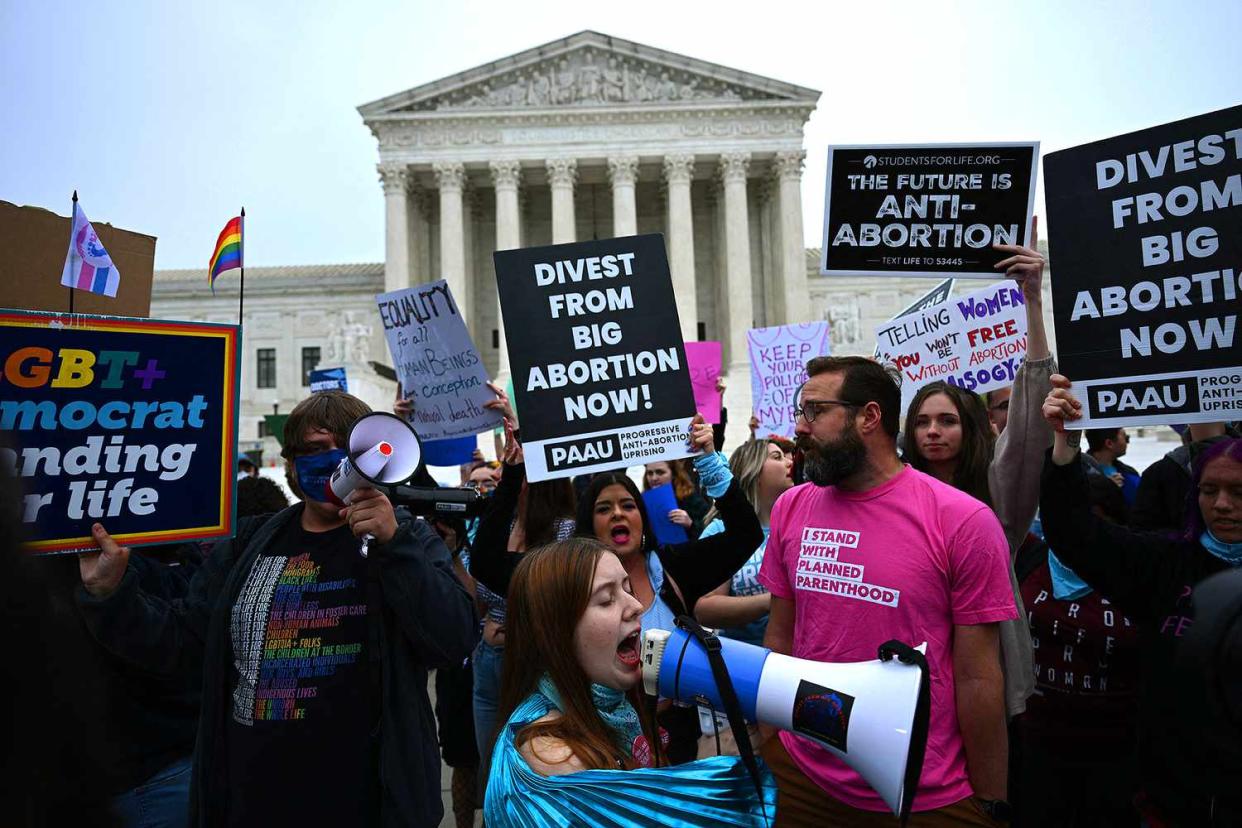Abortions Are Still Legal in the U.S. — but Here's What Could Happen If Roe Is Overturned

- Oops!Something went wrong.Please try again later.
- Oops!Something went wrong.Please try again later.
BRENDAN SMIALOWSKI/AFP via Getty Images Protestors face off outside the Supreme Court after a draft opinion stating the intention to overturn Roe v. Wade was leaked
As of May 3, abortions are still legal in the United States.
That has been true for nearly 50 years, and it doesn't change just because an opinion draft stating the intention to overturn the landmark Roe v. Wade Supreme Court case, which established the right to abortion, was leaked.
In the draft opinion, confirmed to be authentic Tuesday morning by Chief Justice John Roberts, Justice Samuel Alito writes that "Roe was egregiously wrong from the start," and that "we [the Supreme Court majority] hold that Roe and Casey [another ruling on the right to abortion from 1992 which upheld the previous court decision] must be overruled."
According to Politico, which obtained and published the draft opinion, Alito is joined by Justices Clarence Thomas, Neil Gorsuch, Brett Kavanaugh and Amy Coney Barrett in voting to overturn Roe.
Currently, though, the opinion is a draft and "does not represent a decision by the Court or the final position of any member on the issues in the case," Roberts said in a statement, in which he also pledged to investigate the leak. Until the final decision is made — which would likely be in June — abortion remains legal. Justices on both sides can also change their votes if they choose.
If Roe is overturned, that does not mean that abortions are immediately illegal nationwide. Instead, the decision to allow abortions falls to individual states.
There are 13 states — Arkansas, Idaho, Kentucky, Louisiana, Mississippi, Missouri, North Dakota, Oklahoma, South Dakota, Tennessee, Texas, Utah and Wyoming — that have so-called "trigger bans" in place that would almost immediately outlaw abortions if Roe is overturned, according to the Guttmacher Institute, a non-profit research institute focused on reproductive health and rights.
Another five states — Alabama, Arizona, Michigan, West Virginia and Wisconsin — had state bans on abortions in place before Roe established the nationwide right to abortion in 1973, and the could all enforce them again if the case is overturned. And four more — Georgia, Iowa, Ohio and South Carolina — have passed bans or extreme limits on abortion that could go into effect if Roe falls. Florida also recently passed a ban on abortions after 15 weeks of pregnancy, but it is not set to take effect until July.
The Guttmacher Institute also identifies Indiana, Montana and Nebraska as states that are likely to restrict abortion if Roe is overturned based on the political leanings of the legislators currently in office.
RELATED VIDEO: Woman Whose Conception Sparked Roe v. Wade Case Breaks Silence: 'I'm Keeping a Secret but I Hate It'
"[Trigger laws] would make it very hard for a large percentage of women in the country to access abortion care in their own state," Elizabeth Nash, state policy analyst at the Guttmacher Institute, previously told PEOPLE. "It means a lot more people would have to travel for care. And the people who are most impacted by these abortion restrictions and bans are people of color, low-income individuals, young people and LGBTQ individuals — people who are already burdened with insufficient access to healthcare."
RELATED: 32 Celebrities Who Have Shared Their Abortion Stories to Help Women Feel Less Alone
On the other side, 19 states have protected the right to abortion by codifying it into state law; Alaska, California, Colorado, Connecticut, Delaware, Hawaii, Illinois, Maine, Maryland, Massachusetts, Minnesota, Montana (though the Guttmacher Institute expects this to change with the current state legislature), Nevada, New Jersey, New York, Oregon, Rhode Island, Vermont and Washington. It could also become law nationwide if Congress passes legislation codifying Roe, though it appears unlikely that the Senate will agree to a bill.
And last year, the Food and Drug Administration loosened the restrictions on receiving abortion pills by mail. Previously, abortion seekers would need to go in person to be prescribed the two-pills needed and then take them at home, but they can now arrange a telemedicine appointment and get them sent by mail. That, also, is still legal, though anti-abortion lawmakers are looking to restrict that access in individual states.

